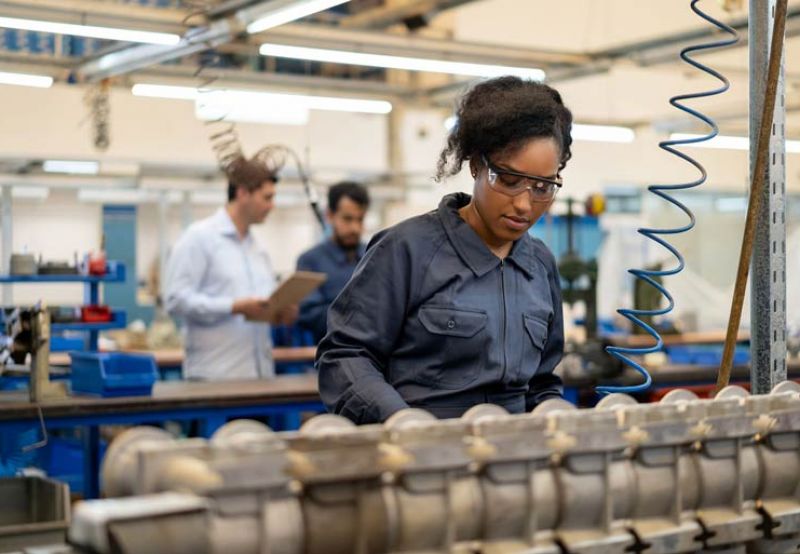
Highlights
- AI and automation help speed up candidate screening and selection, making the recruitment process faster and more objective.
- Administrative tasks like scheduling and compliance can be automated, freeing up recruiters to focus on higher-value work.
- AI improves candidate matching by analyzing data to better align skills and job requirements, leading to improved outcomes for both employers and job seekers.
- Automation enhances the candidate experience by providing faster responses and more support throughout the recruitment process.
- While technology brings efficiency, maintaining a balance between automation and human interaction is key for building strong relationships in staffing.
While existing in today’s modern world, it is no secret that technological advancements come at increasingly high speeds. The staffing industry has seen significant transformation in recent years due to the rise of artificial Intelligence (AI) and automation. Through streamlining processes and enhancing efficiency, these technologies have revolutionized and reshaped the foundation of recruitment and staffing through offering new opportunities for agencies, employers and job seekers.
AI is technology that allows computers and machines to simulate human intelligence and problem-solving capabilities. AI can process large amounts of data in ways no human can. Automation refers to the application of technology to achieve outcomes with limited human input. The combination of AI and automation work together to make systems capable of self-learning, adapting and performing tasks with greater precision and efficiency and in significantly less time than traditional methods.
With the presence of these technologies in the staffing industry today, there are countless processes and areas where AI and automation can be successfully implemented to enhance processes and drive business.
Recruitment Racing
The most commonly discussed use of AI in staffing and recruitment refers to the use of technology to source and screen candidates. Automated systems have the capability to review thousands of resumes and applications in a fraction of the time it would take a human. The process can also be customized to match specific skills, qualifications or requirements of a candidate to the job posting. The enhancement of recruitment efficiency speeds up the activity while also reducing unconscious bias that can occur through manual screening and provide a more objective selection.
Simplifying Administration
Whether or not a recruiter is a fan of administrative tasks, the activities can be time-consuming and repetitive. Automation tools help staffing agencies streamline important but tedious administrative tasks including scheduling interviews, onboarding, and compliance management. Automating these duties allows recruiters to spend more time on value-adding and strategic activities such as building deeper relationships with clients or candidates.
Refining Candidate Matching
The power of AI has significantly altered and brought beneficial results to improve candidate matching. With the ability to analyze vast amounts of data in reference to predetermined criteria for a specific job, AI can successfully predict best fit candidates for the role based off skills, experience and cultural fit. This results in improved candidate fit and higher satisfaction rates for both employees and job seekers.
Improving Candidate Experience
With AI and automated enhancements to processes and technology-driven operations, staffing agencies can now provide 24/7 support and immediate responses to their candidates. This leads to improved candidate experiences, ensuring they feel supported and informed throughout their employment journey.
While the integration of AI and automation have become integral to recruitment processes, concerns have also been raised about the potential loss of human involvement and data security. While these tools improve efficiency and refine accuracy, it is common for job seekers or candidates to feel like they have only interacted with a screen or computer.
At TalentWorld, we implement technology where it makes sense. Not to take away from humans, but rather to enhance their experience. For example, while many recruitment and staffing agencies chose to implement a chat bot to automate the prequalification stage, we chose not to. We instead put a priority on getting to know people the “ol’ fashion way” by meeting them. Because we believe that a candidate's story doesn’t live on their resume, it lives in the experiences and stories they can tell. And this is the only way to uncover transferable skills. To give our Recruiters time to build meaningful relationships, we looked at their admin burden to identify repetitive yet time-consuming communications.
As we continue to embrace AI and automation in recruitment, it’s also important to be mindful of evolving legal frameworks around transparency in the hiring process. In Ontario, the Working for Workers Four Act, 2024 introduced amendments to the Employment Standards Act to ensure job postings provide greater clarity to candidates. This includes not only transparency about pay but also the use of AI in hiring decisions. These new regulations aim to enhance fairness and trust for job seekers while ensuring employers can efficiently navigate the recruitment process without excessive red tape.






